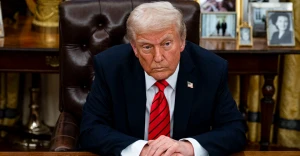
Russian leadership is ready to eliminate Putin in case of resistance – Piontkovsky
The Russian leadership is ready to eliminate Vladimir Putin in case of resistance, but it remains to be seen who will do it
Political analyst Andrey Piontkovsky shared this information with Espreso TV.
"Read carefully these talks by Lindsey Graham, they were published in the Moscow Times, and in Russian in several of my articles. There are two very interesting parts. The first part is the betrayal of the United States that they are offering. Graham came up with a proposal that Crimea, of course, stays, and in the four so-called republics that have been accepted as part of Russia under the Constitution, new referendums are held in which people will express their opinion - surrender, in a word. And the second part describes how his interlocutors reacted. He says directly: I was sitting across from Putin's top officials and advisers, and they were telling me strange things, that yes, we understand that the war was a mistake, and we agree to your plan, but Putin does not agree to it. Do you understand?" And other signals suggest that Putin's principles have changed dramatically after Prigozhin's rebellion, which is considered unsuccessful," the expert said.
Andrey Piontkovsky added that the rebellion was actually successful, as it weakened the power of the Russian leader and showed the cause of the war, which was the focus of Prigozhin's attention.
"Some people interpret Prigozhin as a hawk who fought against the 'soft' Putin in order to wage war even more harshly. Read his speeches - he did not just criticise Shoigu. He said: it was not us who started this senseless war. And these people you asked about - you can talk about individuals, but Graham talks about them in general - they were sitting across from Graham and they told him: yes, we agree with your plan, but Putin is standing in the way - he wants to continue the war because he is afraid that even if we have an honourable draw, he will not stay in power. He will stay in power as long as the war continues. And Graham ends with a phrase that seems to say to his leadership: I believe that we must rely on these people who are ready to accept our plan, and as far as I understood them, if Putin resists, they are ready to remove him - we just have to figure out who was sitting there and who these people are," the political scientist said.
Prigozhin's mutiny: what is known
For several months, there has been a conflict between Yevgeny Prigozhin, the financier of Wagner PMC, and the Russian Ministry of Defense. However, the situation escalated quickly on the evening of June 23.
Allegedly, Russian troops launched a missile attack on the Wagner base. Yevgeny Prigozhin, the leader of the Wagner PMC, announced a "march of justice" and stated that 25,000 mercenaries were heading to Moscow after the Russian leadership refused to hand over Defense Minister Sergei Shoigu and Chief of the General Staff Valery Gerasimov.
The militants entered several regions and moved towards the Russian capital, while at the entrance to Moscow they built firing points, dug trenches and mobilised all security forces.
On June 24, Wagner’s fighters took control of Rostov-on-Don, where they initially gathered around the headquarters of the Southern Military District, and then entered the city of Voronezh. Their convoys, which had diverted from the Ukrainian border, were moving towards Moscow. Military aircraft and artillery under Shoigu's control attempted to stop them. The units of Wagner PMC were last spotted in the Lipetsk region. In Moscow itself, defensive positions were established, trenches were dug, and all security forces were mobilized.
However, on the evening of June 24, the press service of the self-proclaimed President of Belarus, Alexander Lukashenko, released a statement in which the head of the Wagner PMC stated that he was ready to stop the advance of his mercenaries' military convoys, which were already approaching Moscow, and to reach an agreement with the Kremlin. Prigozhin allegedly agreed on this during a conversation with Lukashenko.
Subsequently, Prigozhin and all his fighters left the headquarters of Russia's Southern Military District. Russian leader Vladimir Putin promised that Prigozhin would be able to go to Belarus, and Russia would drop the criminal case against him.
On June 26, Putin gave a speech in which he offered the Wagner PMC fighters three options for future actions: join the Russian Defense Forces, go to Belarus with other PMC members, or return to their families.
On June 27, the Federal Security Service of Russia announced that it dropped the criminal case related to the armed plot, in which Wagner PMC leader Yevgeny Prigozhin was involved.
Meanwhile, Wagner leader, Yevgeny Prigozhin, said that the main goal of the mutiny was "to prevent the destruction of the Wagner PMC, not to overthrow the government" and called it a "march of justice." He also claimed that the offensive on Moscow had stopped because the mercenaries "did not want to shed much blood."
On the same day, the self-proclaimed President of Belarus confirmed the arrival of Yevgeny Prigozhin in the country.
Read more on the events here.
On August 3, Russian media reported that Prigozhin's companies had signed state contracts for at least 2 billion rubles a month after the coup.
On August 8, the National Resistance Centre reported that at the Belarusian airfield Zyabrovka in the Gomel region, on the border with Ukraine, mercenaries of the Wagner PMC began started setting up a tent city to accommodate their military.
National Security and Defense Council’s Secretary Oleksiy Danilov described the mutiny as a special operation to identify generals disloyal to Putin and was agreed with the Kremlin leader. Danilov also predicted another “march on Moscow”.- News











































